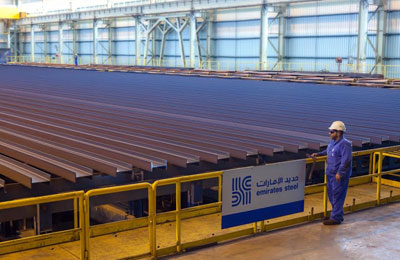
Emirates Steel focuses on value-added products
Abu Dhabi, August 19, 2014
Emirates Steel, a leading steelmaker in the UAE, is set to expand its global presence and add more value-added steel to its product basket.
The company’s plan is to sharpen its focus on high-margin, high-strength value-added products (VAPs), said a statement.
VAPs are mainly finished steel and are termed so depending on their treatment or their end use. The products vary from sheet piles to high silica wire rod to long steel bars to alloy steel. The end users are primarily the construction and fabrication sectors.
Emirates Steel is revisiting its optimisation models, and its strategies for the next five years include focusing on value-added products despite challenges of higher setup times and smaller production campaigns, it said.
Saeed G Al Romaithi, CEO, said: “We have been closely observing the benefits large steel producers in the world are reaping by progressively moving into value-added products and we are hopeful that by adopting this model we will continue to protect our bottom line amid the current challenging industry circumstances.”
“Steelmakers from CIS have a larger share of basic grade steel in their steel production mix and would directly compete with the Chinese as compared to the Japanese or European steelmakers, who have a larger share of value added steel in their product mix,” he said.
Steelmakers globally are continuing to maximise cost-cutting, seeking to improve productivity and shifting focus to high-end value-added products, said a recent EY report, which estimated forecast global demand for steel to grow faster this year at 3.3 per cent, with more demand growth expected outside China, including India, Brazil, and Russia, as well as emerging markets in the Mena region.
“Consumers are shifting to premium steel as it guarantees optimum returns on their investment,” pointed out Al Romaithi. This will eventually result in generating higher profit margins for the Senaat-owned steel company.
For the past couple of years, demand for special steel, with superior quality to meet stringent application norms of various market segments in the Middle East region, has been growing, said the statement.
The primary focus of these product developments are stronger steels with higher tensile strengths and steels with special mechanical properties so that lesser quantity of steel is required by customers for similar applications, it said.
Specialised steel products have been the focus of recent expansion for all major producers of steel in the world and Emirates Steel is now following suit.
“We are committed to supplying innovative steel solutions that add real value to our customers’ operations,” asserted Al Romaithi.
“The industry is moving from commodity-grade steel to high-grade steel, which provides higher margins," he said.
“To remain competitive domestically and in our export markets, we need to grow the share of value added and sophisticated steel products in our export basket," he added.
The idea is to move from a commodity grade to high value product grade which is less volatile and less exposed to market impulses.
Emirates Steel is also developing new grades with higher mechanical properties to meet market demand in the oil and gas sector. The new structural steel that it has started developing is the S355J2, which is intended for the supply of offshore oil and gas structures.
“We have identified the product grades that are required by our customers and we are producing them to order,” said Romaithi.
Meanwhile, the demand for structural steel in the GCC region is expected to reach 2.65 million tonnes by 2018 compared to 3.85 million tonnes for the entire Middle East, according to Emirates Steel estimates.
Emirates Steel hopes that the transition to VAPs can be fruitful. With all types of steel users, from house builders requiring ribbed bars to galvanized roofing sheets to automakers needing high-strength ultra-low alloy material, becoming increasingly demanding about quality, it believes there is significant demand.
“As one moves up the steel value chain, every stage of steel production entails incremental value addition,” explained Al Romaithi.
“There is an urgent need to upgrade our technology and move to high-value products. This will augment our margins, increase our supply to the booming sectors of the economy which need premium steel, and ensure greater penetration of overseas markets in the form of higher exports”, he added.
The production of value-added steel requires the application of technology not available to secondary steel producers and, therefore, is niche business.
“Emirates Steel branding structure includes the highest standards for maintaining superior quality products and an efficient distribution network to serve our clients,” Romaithi added. - TradeArabia News Service







